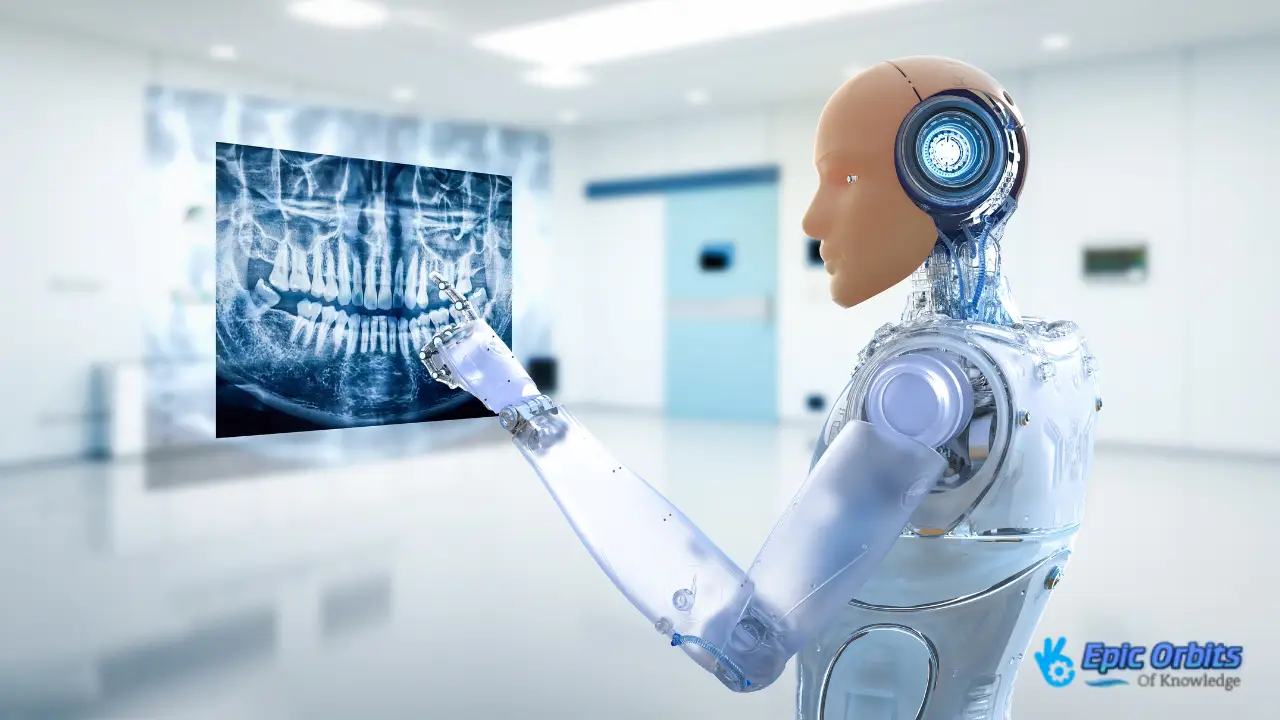The Role of AI in Improving Healthcare Services
Are you looking for top-notch AI in healthcare services? Learn how AI is revolutionizing the industry, enhancing care and efficiency.

Did you realize that technology is changing the way you access AI in healthcare? Artificial intelligence is working behind the scenes to make your healthcare experience better, more efficient, more accurate, and more personalized than ever, right from the moment you enter the doctor's office.
As a patient, you will probably benefit from AI-driven solutions that solve important problems in health care delivery, which will lead to improved results and lower costs. Understanding AI's function is becoming an important skill for both patients searching for improved treatment and healthcare professionals who want to keep on top of industry advancements.
The Changing Face of Modern Healthcare
The healthcare system you have to deal with is complicated, expensive, and not very efficient. You already know this; the indications are all around you. It is clear that the current healthcare system is under significant stress due to rising medical treatment costs and the difficulties associated with filing insurance claims.
1. Problems in delivering healthcare right now
Accessing healthcare is challenging not only because of high costs but also due to quality and availability issues. Medical errors are unfortunately common and, according to some data, rank as the third leading cause of death in the US, highlighting the limitations of a human-only approach to healthcare and the potential need for technological support. Several key challenges intensify these problems. Aging populations drive an increased demand for healthcare services, while provider shortages reduce access to quality care.
Additionally, skyrocketing costs place a heavy financial burden on both patients and providers. Together, these factors underscore the urgency for innovative solutions in healthcare delivery.
2. Why new ideas are needed in traditional healthcare models
The way healthcare used to work was for short-term care, but your requirements have evolved. Chronic diseases are becoming the most common healthcare demands, which means that treatment plans must be flexible and monitored all the time. Another big problem is that healthcare practitioners have a lot of paperwork to do, which takes time away from seeing you.
“The primary problem with healthcare today is not just how complicated it is, but how we need to change from a reactive to a proactive model of care.”
It's evident that innovation is not only appreciated but also needed as healthcare continues to change. By utilizing new technology and methods, we can improve treatment quality, simplify access to healthcare, and reduce costs.
- The ordinary patient produces a lot of health data, which makes it challenging to make judgments about therapy.
- Healthcare professionals are spending more time on paperwork, which means they have less time to spend with patients.
- To successfully treat chronic illnesses, there is an increasing need for ongoing monitoring and flexible care regimens.
How AI is Changing the Way Healthcare Works
AI's ability to change things is about to start a revolution in healthcare. AI is changing every part of how you get health care.

AI algorithms can look at medical photos with a lot of accuracy, sometimes even better than human experts. AI is making your healthcare more customized by finding medicines that are right for you based on your genes and medical history.
AI-powered remote monitoring improves home health services, so you can get treatment in the comfort of your own home. AI is making specialized health care more accessible to everyone, regardless of location or literacy.
How is artificial intelligence used in medicine
We must make medical data accessible and usable for analysis and solution development. By training the model with a sufficient volume of data, the machine can draw conclusions. AI inference is the operational phase of artificial intelligence in which the model can apply what it has learned during the training phase to real-world situations. We can only achieve more widespread, effective, and efficient healthcare applications in this way.
There are four distinct types of artificial intelligence:
- Reactive AI: This is artificial intelligence that does not use machine learning to improve and always reacts the same way when faced with the same situations.
- Limited-memory AI: This is artificial intelligence that uses machine learning to create algorithms based on previous actions. Currently, the primary focus of progress is on this type of artificial intelligence, commonly known as AI/ML (from artificial intelligence/machine learning). This system also involves a branch of machine learning called deep learning, which, through various levels of analysis, is able to extract greater insights from raw data.
- Theory-of-mind AI: This is artificial intelligence capable of understanding and remembering emotions and interacting with people based on that model. Currently, this type of AI is in its infancy and is largely theoretical.
- Self-aware AI, or real-world AI: This approach is artificial intelligence aware of its own emotions, with a level of consciousness similar to that of humans. Self-aware AI is still in its theoretical stage.
When we discuss artificial intelligence in healthcare, we largely refer to rapid advances in both algorithms and applications of limited-memory AI.
Important AI Uses That Are Changing How Patients Are Treated
AI is revolutionizing patient care in previously unthinkable ways. AI is being used in many areas of healthcare to improve results, improve the patient experience, and make services more efficient.
AI systems can now find certain tumors in medical images with 95% accuracy, frequently picking up on little patterns that people would miss. This capacity is greatly improving the accuracy of diagnoses.
Virtual health assistants are changing the way patients engage with healthcare systems by providing 24/7 help with prescription reminders and health questions. They can even tell when someone's voice changes, which might be a sign of mental health problems.
AI looks at thousands of comparable instances to suggest the best treatment options for each person's unique situation, genetic makeup, and way of life. This tailored approach is changing the way treatment is given.
What are the benefits of AI in healthcare?
Advances in AI have a significant impact not only on patient care, enabling doctors and healthcare professionals to diagnose illnesses and provide treatment plans more accurately, but also on administrators, enabling them to allocate medical resources precisely and timely.
This benefits the three main sectors of the healthcare industry (life sciences, healthcare providers, and payers) in many ways.
The ability to acquire, distribute, and use up-to-date information more efficiently assists healthcare professionals in treating patients, accelerates data collection from multiple sources, which improves the management of existing conditions, and helps predict or identify the onset of new conditions or diseases.
More effective data distribution processes allow administrators to efficiently organize and verify claims, streamline claim processing, and improve the accuracy of information and the speed with which it is communicated to patients, clients, and healthcare providers.
Overall, data collection and the development of algorithms based on that data help predict future risks and enable administrators to optimize management and improve care delivery.
Here are some ways in which AI in healthcare is proving to be a valuable resource for patients, healthcare providers, and payers:
1. Faster Diagnosis
Insights from AI algorithms and real-time predictive analytics enable faster diagnoses.
AI also helps patients receive treatment faster, increasing the likelihood of recovery and using fewer resources to address the issue.
For example, HCA Healthcare, a leading healthcare provider in the United States, used Red Hat solutions to build a real-time predictive analytics system that can more quickly and accurately detect signs of sepsis, a potentially life-threatening condition.
2. Claims Management
The red tape surrounding claims and payments can consume countless hours of administrative staff. Furthermore, manual claims processing increases the risk of errors, which is detrimental to both patients and the provider.
Artificial intelligence (AI) automates claims submissions and offers data-driven suggestions for claims management. This allows for faster processing and an optimal experience for employees and customers.
3. Fraud, Waste, and Abuse
Robotic Process Automation (RPA) can review documents with much greater speed and accuracy than manual intervention.
These algorithms are therefore useful for identifying fraudulent activity or waste; they also improve over time, becoming more effective at detecting problems.
4. Expanding Access to Healthcare Offerings
AI-assisted diagnostic systems increase the number of patients receiving services.
For example, AI-assisted radiology or biomedical imaging allows more professionals to interpret ultrasound scans, helping to reduce delays caused by a shortage of specialists and increasing the number of patients undergoing these tests.
5. Drug Development
Developing new drugs requires determining doses and administration methods.
Computational AI tools can improve or even replace trial-and-error approaches and provide faster and more efficient models for monitoring the entire process.
This can accelerate the development of new drugs and reduce costs for pharmaceutical companies and end customers.
How AI-Enhanced Healthcare Services Can Help in Real Life
You probably get more out of AI in healthcare than you realize. AI is already making your healthcare experience better by using algorithms that correctly analyze medical tests and systems that look for risky drug combinations.
AI systems compare your symptoms to millions of other comparable instances, which makes your diagnosis more accurate and cuts down on the loop of referrals and repeat visits that commonly happens in conventional healthcare.
AI-powered healthcare services are cutting administrative expenses by as much as 30%. Eventually, you might see these savings in decreased insurance premiums or treatment costs, which would make healthcare more accessible.
Making patient experiences more personal:
- AI-powered home health monitoring lets you leave the hospital sooner, so you may recuperate comfortably at home while still getting excellent care and support.
- AI-powered screening tools are helping places with a lack of providers get specialized treatment by figuring out whether a patient needs to see an expert remotely.
The Role of AI in Your Healthcare Future
AI is changing the future of healthcare by making it more proactive and tailored to each individual. AI systems can warn you of potential health issues so you can get the right preventative care.
AI will work with home health monitors to create a smooth health ecosystem that looks at your vital signs and how well you follow your prescription plan to improve your treatment plan. Community-based care will also change, making sure that all institutions provide the same high-quality care.
AI will also help close the healthcare gap between cities and rural areas by making it possible to diagnose and arrange treatment from a distance. AI-powered tools will be available 24 hours a day to help people with mental health issues during times of crisis.
As AI becomes better, your healthcare experience will change from getting treatment to preventing illness. It will look at trends across populations to find environmental or behavioral elements that impact public health.
Conclusion
AI in healthcare is changing the medical field by making care and treatment better for patients. AI in healthcare helps physicians make judgments more quickly and accurately and makes hospital operations run more smoothly.
AI's involvement in healthcare is becoming more and bigger, and it's coming up with new ways to help with diagnosis, patient monitoring, and individualized therapy.
Using AI in healthcare makes things run more smoothly, cuts down on mistakes, and gives patients across the globe better treatment.



